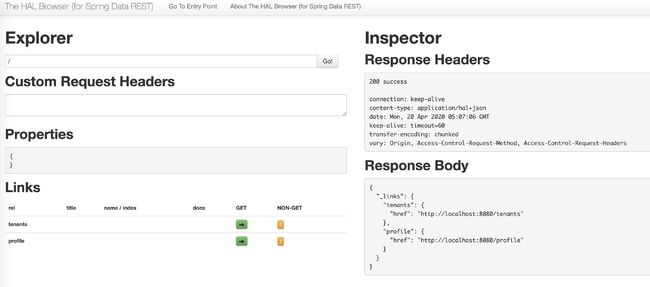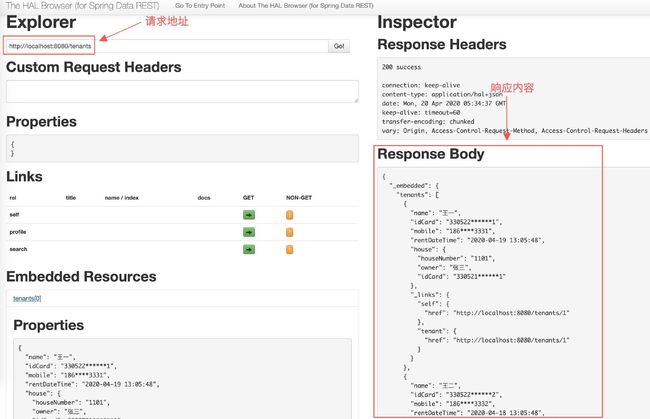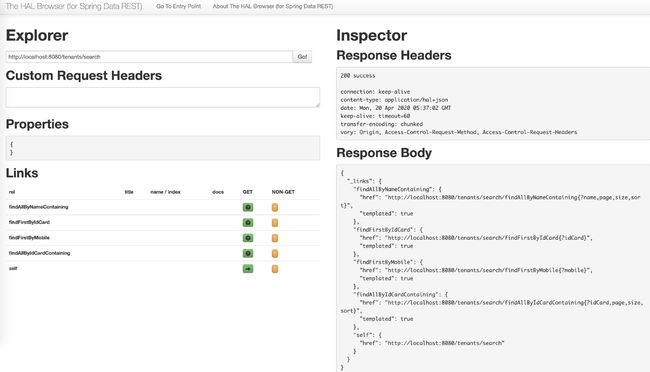简介
Spring Data REST是Spring Data项目的一部分,可轻松在Spring Data存储库上构建超媒体驱动的REST Web服务。
Spring Data REST 构建在 Spring 数据存储库之上,分析应用程序的域模型,并公开模型中包含的聚合的超媒体驱动的 HTTP 资源。
特征:
- 使用 HAL 媒体类型来公开域模型的 REST API。
- 适用集合、项目(item)和关联资源表示你的模型。
- 通过链接导航支持分页。
- 允许动态过滤收集资源。
- 通过资源api来暴露你repositories中定义的资源查询方法。
- 允许通过处理Spring ApplicationEvents来处理REST请求。
- 公开有关ALPS和JSON Schema模型的元数据。
- 允许通过投影定义客户特定的表示形式。
- 发布一个定制的HAL浏览器变体以利用公开的元数据。
- 目前支持JPA,MongoDB,Neo4j,Solr,Cassandra,Gemfire。
- 允许对公开的默认资源进行高级自定义。
:目前对Spring Data REST适用分析:快速生成数据库资源对外的接口(适用于一些逻辑简单的数据对外接口)
分析
使用Spring Data REST并实现以下功能来满足日常api的开发过程:
需要满足的一些要求: 1.针对字段级别,方法级别,类级别进行限制(禁止某些字段,方法,接口的对外映射)。 2.对数据增删改查的限制(禁止某些请求方法的访问)。 3.能个性化定义请求的路径。 4.对所传参数进行值校验。 5.响应统一处理。 6.异常处理。 7.数据处理的切面。
以上列出了我们日常接口开发中比较常见的一些功能需求,这里将演示使用Spring Data REST并结合实现上述功能来快速开发HAL REST API。
准备
条件:
jdk11
Springboot 2.2.6.RELEASE
maven
Spring Data JPA
添加依赖
本文中演示Spring Data JPA结合Spring Data REST
1.添加Spring Data持久层依赖:
org.springframework.boot
spring-boot-starter-data-jpa
com.h2database
h2
目前Spring Data REST支持JPA,MongoDB,Neo4j,Solr,Cassandra,Gemfire,所以使用时可根据自己的需求引入不同的Spring Data依赖,本文将使用JPA作为演示。
2.添加Spring Data REST相关依赖
org.springframework.boot
spring-boot-starter-data-rest
org.springframework.data
spring-data-rest-hal-browser
简单尝试
示例中将用一个简单的租客系统来做演示。
创建一个房子类
@Entity
@Data
@Accessors(chain = true)
public class House {
@Id
@GeneratedValue
private Long id;
private String houseNumber;
private String owner;
private String idCard;
public House() {
}
public House(String houseNumber, String owner, String idCard) {
this.houseNumber = houseNumber;
this.owner = owner;
this.idCard = idCard;
}
}
创建一个租客类
@Entity
@Data
@Accessors(chain = true)
public class Tenant {
@Id
@GeneratedValue
private Long id;
private String name;
//隐私信息不需要暴露
private String idCard;
private String mobile;
@JsonFormat(pattern = "yyyy-MM-dd HH:mm:ss")
private LocalDateTime rentDateTime;
@OneToOne(cascade = CascadeType.ALL, orphanRemoval = true)
private House house;
public Tenant() {
}
public Tenant(String name, String idCard, String mobile, LocalDateTime rentDateTime, House hous) {
this.name = name;
this.idCard = idCard;
this.mobile = mobile;
this.rentDateTime = rentDateTime;
this.house = hous;
}
}
此时,我们新建一个租客的Reopsitory
public interface TenantRepository extends CrudRepository {
Page findAllByNameContaining(String name, Pageable page);
Page findAllByIdCardContaining(String idCard, Pageable page);
Tenant findFirstByMobile(String mobile);
Tenant findFirstByIdCard(String idCard);
}
运行前我们准备好初始化数据
@SpringBootApplication
public class SpringDataRestDemoApplication {
public static void main(String[] args) {
SpringApplication.run(SpringDataRestDemoApplication.class, args);
}
@Resource
private TenantRepository tenantRepository;
@PostConstruct
public void initRepo() {
//准备房子信息
List houses = new ArrayList<>();
House zhangsan = new House("1101", "张三", "330521******1");
House zhangsi = new House("1102", "张四", "330521******2");
House zhangwu = new House("1103", "张五", "330521******3");
House zhangliu = new House("1104", "张六", "330521******4");
House zhangqi = new House("1105", "张七", "330521******5");
House zhangba = new House("1106", "张八", "330521******6");
//准备租客信息
List tenants = new ArrayList<>();
tenants.add(new Tenant("王一", "330522******1", "186****3331", LocalDateTime.now().minusDays(1), zhangsan));
tenants.add(new Tenant("王二", "330522******2", "186****3332", LocalDateTime.now().minusDays(2), zhangsi));
tenants.add(new Tenant("王三", "330522******3", "186****3333", LocalDateTime.now().minusDays(3), zhangwu));
tenants.add(new Tenant("王四", "330522******4", "186****3334", LocalDateTime.now().minusDays(4), zhangliu));
tenants.add(new Tenant("王五", "330522******5", "186****3335", LocalDateTime.now().minusDays(5), zhangqi));
tenants.add(new Tenant("王六", "330522******6", "186****3336", LocalDateTime.now().minusDays(6), zhangba));
tenantRepository.saveAll(tenants);
}
}
启动项目,并且访问localhost:8080,如下图:
上图是Spring Data REST的HAL数据浏览器,通过它能高效的查询和调试Spring Data REST对外提供的接口。
我们可以看到响应内容的格式,正是符合HAL类型的格式。
访问http://localhost:8080/tenants/search
上图可以看到,Spring Data REST对外暴露了我们在Repository中定义的查询方法,并且可以看到response Body中数据格式符合HAL格式类型,通过HAL格式的响应数据,我们轻松就能知道这些查询方法对应的请求路径,起到了一个文档的作用,使api能够自发现。
总结
本文初步的介绍了Spring Data REST的功能及特征,并且演示了如何在项目中引入Spring Data REST,并结合Spring Data REST实现了简单的演示Demo。下一篇文章将介绍并演示如何在Spring Data REST中实现一些必要的功能,以此来满足我们日常的接口开发工作。
本文代码示例:https://gitee.com/jeker8chen/spring-data-rest-in-practice.git
关注笔者公众号,推送各类原创/优质技术文章 ⬇️
![]()


